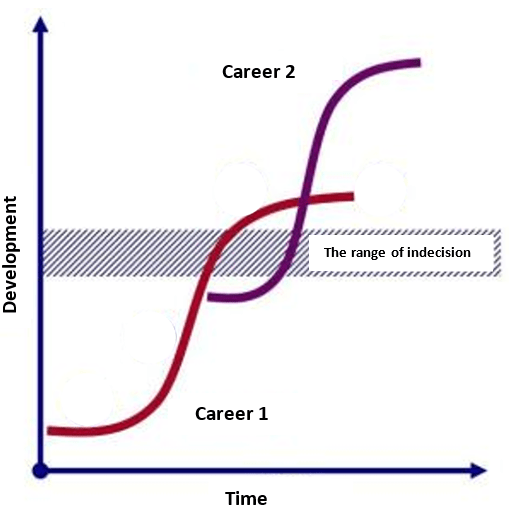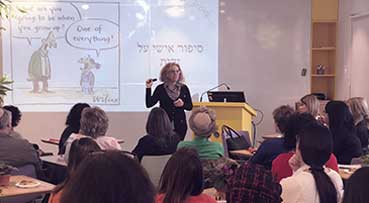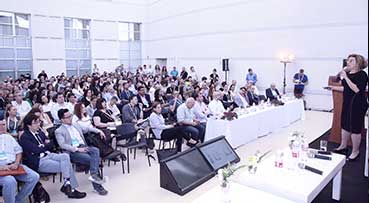“Let’s hear synonyms for the word CHANGE” asked our guide during a tour in Jerusalem. We were discussing history, not work. And the answers ranged from those who associate change with development, new beginning, growth, all the way to those for whom change caused concern, anxiety and even fear. This full range, from opportunity and paralysis, is in a large part also the story of careers in this era, where change is the only constant.
The most common reactive response to the fear of change is the attempt to create stability within it. In the world of work, the fear that technology will replace us created the concept of “Robot Proofing”, an idea which suggest a variety of actions for us to protect ourselves, to make us irreplaceable. In a book with this title, Robot Proofing includes, for example, an educational system, which doesn’t fill students’ heads with information, but rather helps them shape their ability to think in different ways, encouraging flexibility as well as various approaches so that they can invent, discover and produce what society values. Surely, we should be able to develop qualities which give us, humans, an advantage over the machine, at least in the short term. But as we are busy trying to identify these qualities and skills, technology is learning and is already doing a lot of things that we once said it could not do. And the financial systems have a vested interest in expanding the technological capabilities as far as possible, realizing it will always be faster, cheaper and more efficient than human beings.
The problem with this conversation is that it assumes we can find something, some skill or capability, which will slow down or our need to change in the face of technology. In the assumption that if we only learn the “right profession”, specialize in the “right skills”, find the “right path”, then we will be protected. This very assumption is the most dangerous thing we can do for our career.
We know that life goes through cycles. But knowing doesn’t mean accepting, or being ready, it does not mean we are at peace with the changes. Think about the cycles families go through. We know the day will come when the children will leave the house. We understand this is the way of the world, we prepare ourselves, we even support them as they set out their path for college or careers. But as we do that, we also hope our own lives will not change. But they will. Because the cycle of life needs to happen, it is natural, it is inevitable. And resisting it will not prevent what needs to evolve, it will only prolong the pain and delay our ability to transition to the next stage.
This is true for careers as well. Once we accept the fact that careers also have life cycles, it will be easier for us to adapt to the new world of work.
The generation now retired had typically only one career. That means they selected and acquired a profession, found a job and climbed the ladder until retirement. If you are today in mid-life you probably started out thinking you too will have a single career. This is what we were promised back when we started out our studies, that we will have a profession, one which will then shape our entire career path. Only to discover the rules have changed.

Starting with the point of entry, which no longer depends on acquiring what we called a “profession”. Many young people today begin their careers, or at least begin building their education and experience towards that career, while still in school. The endless access to information and learning available today enables the young generation ample opportunity to discover worlds and experience forms of action, even work, outside the classroom. And as they exit their school years, they no longer select a profession for life. Rather, they choose an initial direction based on their interest and skills, possibly including vocational or academic education. The idea that education is an ongoing process and not the basis for a life-long profession gives rise to a complete new view on career paths. It allows us to test our initial expectations against those first work experiences and adapt the next phase and the next one in a continuous cycle. We are still required to grow skills and experience, to accumulate layers of knowledge and know-how. But we now often change the “how”, sometimes the “what” of our work, and most certainly the titles used to describe it and define who we are professionally.
In this new era, the cycle of life does not stop only with people. Roles today also have shorter life cycles , even capabilities, knowledge, entire professions and industries. Since careers are made up of a series of roles and are based on capabilities and professions, the life cycle of a career today also shortens today’s employee will have more careers throughout their lives. Cycles mean we go through periods of learning, followed by growth, then maybe stability for a while, as we peak in this particular job or expertise. That is the point where we simply know, are known, influence. However this will be followed by a downturn, always. If not for us, because of the cyclical nature of roles, capabilities, professions. And if we insist on holding on, our career will cycle down with it. The only way up from here is to identify the right time to jump onto a new career cycle, move on to a period of learning and new growth.
Amidst all this change, we must learn to manage our careers in cycles. And this requires that we are able to identify that we are approaching a transition point, towards the end of the peak our our current career curve. Which means it is now time to evolve our learning and development towards the next phase. It is a tricky period, one of hesitation. We don’t want to leave our peak too soon, but we can’t afford to be late to build up what we need for the next career curve. First and foremost, we need to develop the ability to recognize that we are approaching this phase, where our current curve is heading towards a decline. Then, we need to realize and accept it is time to begin a transition. This is the time for questions. What happens to our profession? Can we identify new capabilities we need to develop or maybe expertise we need to unlearn as it is becoming irrelevant? This is the time to rephrase our professional identity and shift from thinking about it in terms of roles and profession and writing our CV of accumulated skills and experience. The latter will shift with us, no matter what the next career curve looks like, even if we end up evolving to what might be a new profession or roles we’ve never done before. It helps to think beyond our business card titles to that which stays with us. And explore the changing worlds of work around us, what other roles and professions require the skills and experience we have, even if they call those roles by other names? Even if there are elements in those roles we would need to learn, maybe exactly then.
It is not a question of whether this shift will find us, only a question of when and whether we will be ready for it. As the world speeds up around us, we will probably need to shift again, more frequently maybe, certainly more than we assumed when we set out on our initial career path. If you are at a relatively early phase of your career, this is great news. It means that your current choices are only the first steps on a rock climbing wall, one with endless possibilities of journeys and destinations. The choices you make now define the experience you will gain and the capabilities you will develop in the coming years. But they do not define your entire life long career path and you will have plenty of room to adjust and evolve. It should be liberating to know that your path will be yours and not one defined for you by others, that it will evolve based on more choices, ones you will make in the future. And that future is not dictated by a single choice you are required to make early on, when you start your career. It is not your first job, or your selected degree that will lay out your path. It is yours to define with every choice you make.
If you’re in mid-life, there’s a good chance your career so far has been dictated by those early choices. Your selected profession and choice of early jobs has likely defined your career ladder. But in this new era, even if you’re comfortable staying on that ladder you will probably not be able to stay on it through retirement, whenever that is. At some point, you will reach the peak of your current career curve. This could happen to you, maybe because your area of expertise is changing and you are not changing with it, or your role is evolving and your skills don’t match the new role, or maybe this is happening to your employer, mabe even the industry you’re in. Or you could be the one making it happen, if you already feel you no longer want to keep doing what you’re doing, that you need to follow your heart and change your path. Either way, you need to find your way onto the next career curve.
That next curve does not have to be a new beginning. In most cases, it is only the evolution of who you already are professionally, the value you bring, with the addition of new capabilities or lateral skills. Think of it as “revision updates” which redefine what we need in our profession – updated tools, new partnerships, different ways of doing things. We must learn to manage these transitions, the transitions of employers, jobs, occupations, and types of employment.
This transition phase, the range of indecision, that space where we do not have to, but probably should move from one career cycle to the next, this is a very challenging space. It is difficult to identify but it is even harder to master the courage to act. You might be familiar with the saying – it’s not about what you know you don’t know, but about what you don’t know you don’t know. Once we already recognize the need to evolve, to acquire new knowledge, skill or experience, the path to implementation is set. The difficulty in this new world of work is that we are used to surfing on one familiar career path until something happens and causes us to discover we have become irrelevant. When we are no longer valued, when our skills are not needed, our experience no longer relevant. When someone had found another way to create the value we were there to create and we never even noticed.
As we move further into this new world of work, we hope the systems around us will help us identify and see potential and growing gaps between what we are currently doing and what the future requires. We will see the evolution of tools that will help us identify what we need to learn and unlearn, who needs what we know and what are the gaps we need to fill to get there. Until this happens, we are on our own in making sure our skills and knowledge align with what the market needs today and will need tomorrow. We must learn to identify the telltale signs and emerging opportunities.
And have no fear. For it takes courage to move from one career curve to another. And while staying put might seem as the safe option in the short term, growth and development are the only ways onto the next career curve and a continuous path forward. And as for that area in-between, the peak right before the decline, we must learn to identify it quickly as we are sure to have more and more such transitions in a longer career journey. In this new world of work, we have to learn to welcome these transitions, to learn to cease the opportunity rather than worry about the endings and resisting the change.
Once we accept careers have life cycles, we can lean forward, not backward, into the next cycle and accelerate the new curve. And believe that what lies ahead might not be familiar, but it can be as wonderful as what we’ve left behind, possibly even more.
The writer is a strategic consultant, lecturer, and blogger. niritcohen.com
Making the Future of Work work for you.

![large-AX1A2125-2[1] large-AX1A2125-2[1]](https://niritcohen.com/wp-content/uploads/elementor/thumbs/large-AX1A2125-21-pnzedcs72atx5aeurqytqdiihxixlq02re9mlz805s.jpg)






